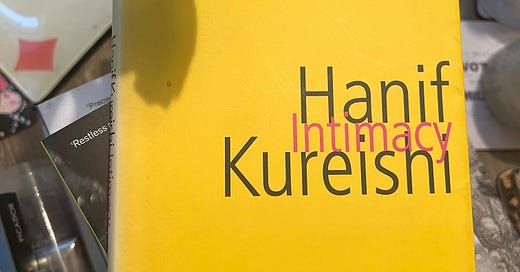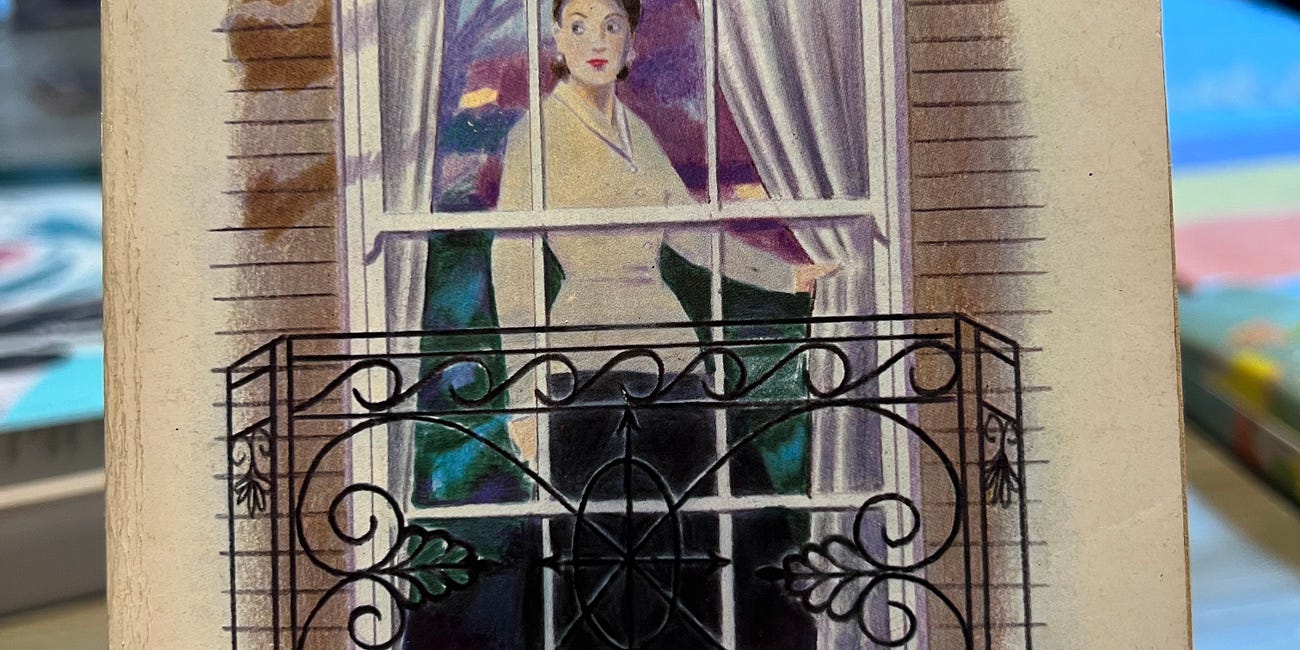I’m a playwright who writes about twentieth-century novels and other literary/theatrical matters. Subscribe to The Essence of the Thing with your email address to have my newsletter delivered to your inbox. It’s free.
Hanif Kureishi’s Intimacy had till this week been sitting on my bookshelf unopened since it was published by Faber in 1998, the spine of its yellow cover fading in the London light. But, as I write in my About page, there are lots of unread novels in my house, many of them well-known.
We often say, ‘To my shame, I haven’t read …’, but I no longer feel shame or guilt about it: a book’s time will come, or it won’t. Life’s short: read whatever you like, whenever you like. This new free Substack – thanks for subscribing and/or reading! – is a weekly reflection on some old book whose time, for me, happens to have come.
I can see why some people don’t like Intimacy: it’s not a novel that seems very interested in women as three-dimensional human beings.
Nevertheless, by about page 12, I began to see it as a warts and all examination of 1990s London middle-class male narcissism: the intimacy is between the narrator and himself.
There’s no narrative irony, so I can’t honestly say that I found much evidence that this is a defensible reading. Take the following:
Susan, if you knew me you would spit in my face. I have lied to you and betrayed you every day. But if I hadn’t enjoyed those women I wouldn’t have stayed so long. Lying protects all of us; it keeps the important going. It is a kindness to lie. If I’d been good all those years, who’d have been impressed. God? A world without lying would be impossible; a world in which lying wasn’t deprecated is also impossible. Unfortunately, lying makes us feel omnipotent. It creates a terrible loneliness. Here, tonight, I feel cut off from you and from everyone. Truth telling, therefore, has to be an ultimate value, until it clashes with another ultimate value, pleasure, at which point, to state the obvious, there is conflict. (pp. 103-4)
Perhaps, in the light, or the shade, of such a passage, it’s more honest to call the narrator a dishonest, self-justifying prick. He certainly has it every which way.
But the writing is always compelling – like many male-centred 1990s plays are compelling. The brilliant, enviably cool passages about 1970s popular culture recall Kureishi’s wonderful The Buddha of Suburbia, which I’ve read twice over the years and would read again in a heartbeat. It’s an intriguing document of the (rather complacent?) 1990s. There are many smart observations about England’s wretched politics, and almost every page has smart and/or poetic observations about the joys and pains of love – because ‘Nothing is as fascinating as love, unfortunately’ (p. 71).
And, in a world saturated by literary and critical theory, and by people on platforms like this one wanging on about the books they’ve read, I liked the narrator’s reason for studying philosophy not literature:
Philosophy was formal, abstract, cool. I chose it because I loved literature, and didn’t want stories that had been poisoned by theorizing. For me that was like food that had been chewed by other people. (p. 39)
In other reading (and theatre) this week …
I was hit hard by Meg Nolan’s short and raw and honest piece for The Guardian about the crises of identity that can result from emigration.
In London, Dominic Dromgoole’s elegant production of Jordan Harrison’s Marjorie Prime has four exquisite performances: actors utterly in control of their story and their space. It’s one of those plays that grows on you for days after you’ve seen it.
And Danny Lee Wynter’s Black Superhero is akin to Tennessee Williams, exhilaratingly unapologetic about itself.
Until next time. Will it be Anita Brookner’s Hotel du Lac or Elizabeth Jane Howard’s The Long View?
Update: it was Elizabeth Jane Howard. Follow the link:
Elizabeth Jane Howard’s The Long View
I’m a playwright who writes about twentieth-century novels and other literary/theatrical matters. Subscribe to The Essence of the Thing with your email address to have my weekly newsletter delivered to your inbox. It’s free.





